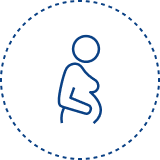Cushing’s syndrome is a rare disease which happens when your body has too much of the hormone cortisol over an extended period (chronic exposure). This can be caused by taking oral corticosteroid medication, or your body itself producing too much cortisol (excess production of cortisol by the adrenal glands).1
Cushing’s syndrome is more common in women than men (by a ratio of 4:1) and patients are typically aged over 40 at the time of their diagnosis.2
Cortisol is a steroid hormone produced by the adrenal glands (two small glands on top of your kidneys) and is sometimes called the “stress hormone” because it helps the body cope with stressors like illness or injury. Cortisol increases the body’s metabolism of fat and carbohydrates and breaks proteins. It also helps control blood pressure and reduce inflammation (anti-inflammatory role).1,3

Harvey Cushing first described the disease in 1932, which came to be known as Cushing’s syndrome.4
Harvey Cushing was a famous American Surgeon who developed many foundational techniques and practices in neurosurgery, most notably the use of X-rays to diagnose brain tumours5.
As the world’s leading teacher of neurosurgeons in the early 20th century, Harvey Cushing is often described as the “father of neurosurgery”.4
Fittingly, Cushing’s Awareness Day is celebrated on April 8th, Harvey Cushing’s birthday.4
The clinical manifestations of Cushing’s syndrome are often non-specific and can be confused with similar symptoms of other conditions.1,9

Many other conditions may be associated with mortality in patients with Cushing’s syndrome10


UFC: Urinary Free Cortisol
Dexamethasone: A synthetic glucocorticoid
DST: Dexamethasone Suppression Test

Experts agree that the earlier you are treated, the better. This is why an early diagnosis of Cushing’s syndrome is crucial.9,10
The aim of treatment is to reduce mortality by normalizing cortisol levels and treating comorbidities associated with Cushing’s syndrome.10
The International Guidelines typically recommend surgery. Removing the tumour by surgery is always the first line of treatment. When this is not successful or feasible, other treatments can be used, such as medical therapy (adjuvant agents that lower cortisol levels) and radiotherapy.7,13
The use of each treatment option depends on the etiology.7,13
You are now leaving the HRA Pharma Rare Diseases funded site. HRA Pharma Rare Diseases are not responsible for any information on any third-party site.
Click the link above to continue or CANCEL